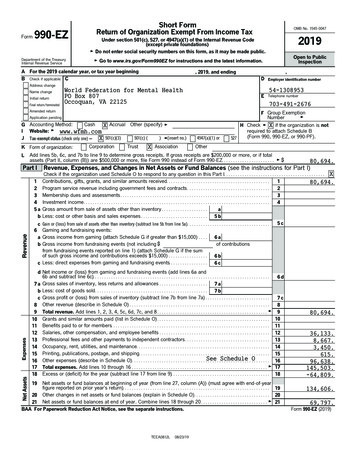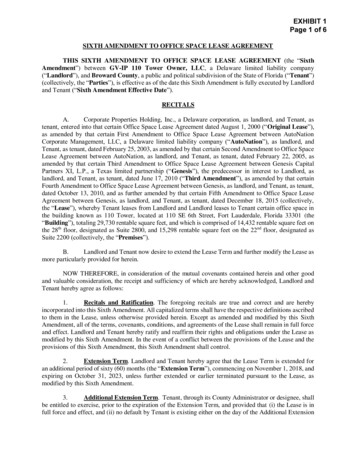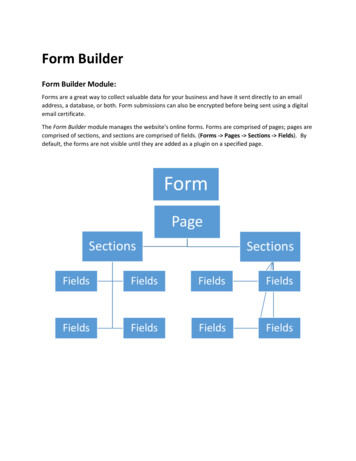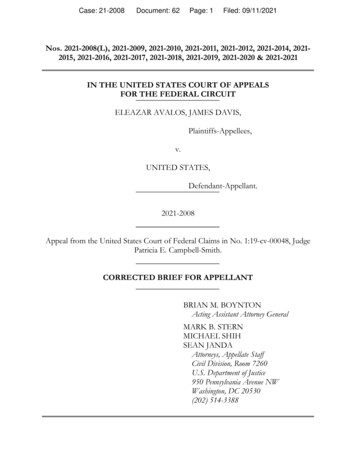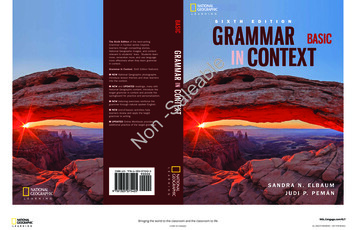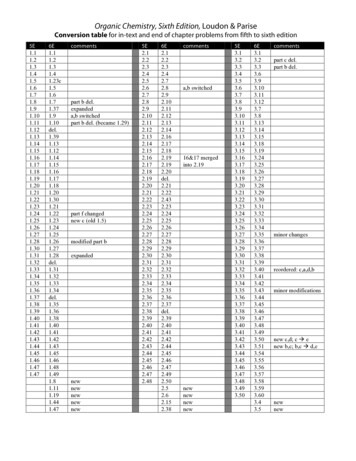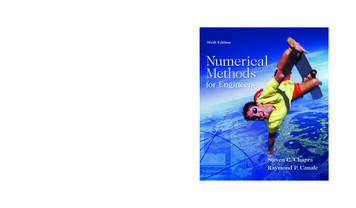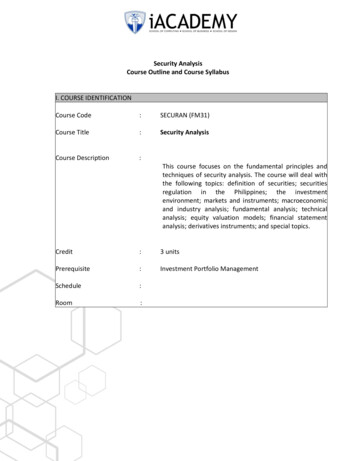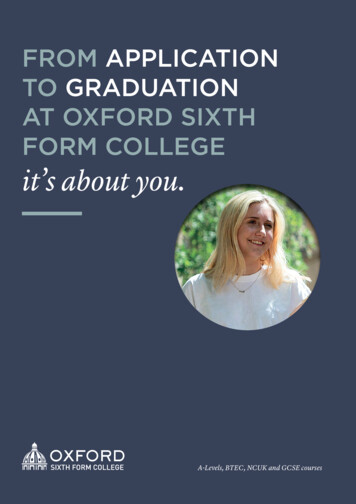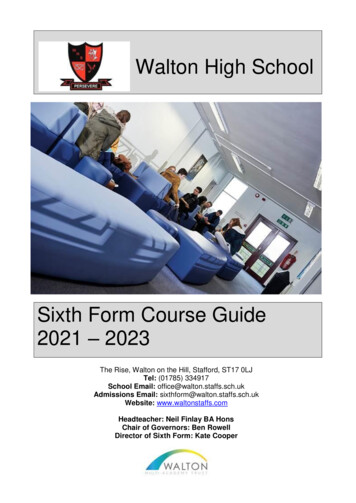
Transcription
Walton High SchoolSixth Form Course Guide2021 – 2023The Rise, Walton on the Hill, Stafford, ST17 0LJTel: (01785) 334917School Email: office@walton.staffs.sch.ukAdmissions Email: sixthform@walton.staffs.sch.ukWebsite: www.waltonstaffs.comHeadteacher: Neil Finlay BA HonsChair of Governors: Ben RowellDirector of Sixth Form: Kate Cooper
ForewordWelcome to the Walton Sixth Form Course Guide. This is intended to be one of the most vital toolsfor planning your next steps. As we know it can be a stressful time contemplating what you will needto have planned after the GCSE’s in the summer. Some of the decision-making you will have to dowill be helped by the advice of teachers and Heads of Departments, by tutors and pastoral staff, byexternal careers advisors and by the senior management and Sixth Form Heads. With opportunitiesover the coming weeks for you to seek advice and to research and discuss your options Post 16, youshould be able to make a strong and informed set of choices for applying to the Sixth Form.If you are unsure about which subjects to choose, remember that you can access subject talks at ourvirtual open evening and you can attend taster sessions during our summer induction day.It is perfectly possible to mix subjects from either pathway providing you meet the entry requirementsand the blocks match. We will consider every application on its individual merits.One of the main reasons for choosing Walton is the excellent academic achievements gained by ourSixth Form students whilst here. The teaching you will get and the support you will receive throughoutyour two years with us will give you every single opportunity to do your best.The Sixth Form team and teaching staff here at Walton are looking forward to welcoming you andsupporting you in your studies and preparation for your next steps in life.Finally, work as hard as you can on your GCSE’s, this is where this whole journey starts: Good luck.We look forward to seeing you during this application process and in September.Mrs K CooperDirector of Sixth Form1
ContentsForeword from the Director of Sixth Form . 1Contents . 2Course OutlineArt. 3Biology . 5Business Studies . 7Business BTEC . 9Chemistry . 10Computer Science . 12Design and Technology -Product Design . 13Design and Technology -Food Science and Nutrition Level 3 Diploma . 14Economics . 15English Language and Literature . 17English Literature . 19Extended Project (EPQ) . 21Film Studies . 22Forensic Science and Criminal Investigations BTEC . 24Geography . 25History . 26Mathematics . 27Further Mathematics . 29Media Studies . 31Modern Languages . 33Music. 39Photography . 41Physical Education . 43Sport Level 3 BTEC . 45Physics . 46Psychology . 47Religious Studies (Philosophy & Ethics) . 48Sociology . 50Option Blocks 2021 . 51Timetable 53Key Dates . 542
Art & DesignAwarding body:AQAEntry requirements:Grade 5 or above in Art & Design GCSEThe course is aimed at:Students who wish to study Art to a higher level. Careeropportunities include Graphic Design, Architecture, Publishing,Teaching, etc.Course:2 year full A LevelDescription of the Course/Course StructureIn the Art department, we offer the new 2-year full A Level.The full A level in Art & Design is a 2-year course with 1 Externally Set Assignment (exam) at the end of thesecond year.This is a new course for students who want to study Art to a higher level and is ideal for those who want to goon to study an Art related course at University.The A level course is made up of two components that stretch across the 2 years:Component 1 - Personal investigation (60%)1. Practical workThe Personal Investigation is an extended practical project based on a personal response to a theme orstarting point. Students will generate ideas and experiment how to express them through a variety of materialsand processes. They will develop and refine their ideas through experimentation and research into differenttechniques, styles of art and the work of other artists.Personal studyThis is a separate piece of critical and analytical writing (1000 words) making links to the student’s ownPersonal Investigation, and supported by artists research and references. Through the personal study,students will demonstrate understanding of relevant social, cultural and historical sources. Students will alsoexpress personal interpretations or conclusions and use technical and specialist vocabulary.2.3
Art & DesignComponent 2 - Externally Set Assignment (40%)This is an externally set assignment from the exam board. Students will produce another practical project inthe same manner as their Personal Investigation, developing their skills to a higher level in response to astarting point set out in the exam paper.Students will be expected to submit all their preparatory studies (sketchbook work) and an outcome that willbe completed in a Controlled Assessment (15 hours).4
BiologyAwarding Body:AQAEntry Requirements:This Biology course builds on concepts and skills that have been developed inthe GCSE Biology and combined Science course. Students wishing to applyfor the Biology course will need to have achieved a minimum of two grade 6’sfrom the combined Science course or a 6 from Biology GCSE (triple). Grade 5higher tier Mathematics is also required due to the demands of the course. Inaddition, the commitment, attitude and effort that the student brings to thecourse will have a major impact on their success.Aimed at:Students with a passion and enthusiasm for Biology.Students who wish to develop their knowledge and skills for the study ofBiology/Healthcare /Medicine in Higher education.Description of the Course/Course Structure:Over two years this course is packed with essential core biological topics and practical work.Sections 1– 4 are designed to be covered in the first year and 5-8 are covered in the second year.There are also opportunities for practical skill development throughout the entire course and a 4-day fieldtripresidential takes place in the summer term (Year 12) to cover essential ecological sampling techniques anddeliver the ecology theory.The Core Topics 1 Biological molecule – including proteins, fats, carbohydrates, enzymes, DNA structure. 2 Cells – including cell structure, viruses, cell division, diffusion, osmosis, immunity. 3 Organisms exchange substances with their environment – including gas exchange, digestion andabsorption. 4 Genetic information, variation and relationships between organisms – including DNA, genes andchromosomes, biodiversity, genetic diversity and taxonomy. 5 Energy transfers in and between organisms (A-level only) – including photosynthesis, respiration,ecology and nutrient cycles. 6 Organisms respond to changes in their internal and external environments (A-level only) – including thenervous system and homeostasis. 7 Genetics, populations, evolution and ecosystems (A-level only) – including inheritance. 8 The control of gene expression (A-level only) – including gene technologies.Ecology fieldwork at Yorkshire5
BiologyAssessment Information A Level:UnitDurationMarksWeightingA LevelOther Information1 Core Biology2 hours9135% of ALevel Topics 1-4 andpractical skills.76 marks: a mixture of shortand long answer questions 15 marks: extended responsequestions2 Core Biology2 hours9135% of ALevelTopics 5-8 andpractical skills. 76 marks: a mixture of shortand long answer questions 15 marks: comprehensionquestion.3 Core Biology2 hours7830% of ALevelTopics 1-8 andpractical skills 38 marks: structuredquestions, including practicaltechniques 15 marks: critical analysis ofgiven experimental data 25 marks: one essay from achoice of two titlesAdditional Information:Sitting of Assessment UnitsJune 2023 - A Level Units 1, 2 and 3.Practical SkillsThese are assessed within the written papers and overall at least 15% of the A Level marks account for this. Toanswer these questions students will have been taught and acquired competence in the appropriate areas of practicalskills required by the exam board.In addition, students will need to be awarded a ‘pass’ by their teacher for practical skills mastery. This is a separateendorsement alongside the A Level. In order to achieve a pass, students will need to have met expectationsdeveloped through the explicit acquisition of the technical skills in any practical activity undertaken throughout thecourse of study. There are 12 practical activities prescribed in the specification, which cover the requirements. All ofthis will be evidenced and centrally stored in school in folders. All students have to complete the practical work to beawarded the pass.6
Business StudiesAwarding Body:EdexcelEntry Requirements:General sixth form entry requirements (5 Grade 5’s at GCSE- Grade 5 in EnglishLanguage and Mathematics). Students studying A Level Business Studies do NOT needto have studied GCSE Business Studies. Those who have studied GCSE BusinessStudies are expected to have passed at Grade 5 or above.Aimed At:Business Studies students can often relate their own experiences of work to their studies and have a broaderunderstanding of the real world at local, national and international levels. The subject combines well with their otherstudies at GCE Advanced Level and is a popular choice to study in Higher Education.The subject matter also proves this relevant when students enter the world of work and financial decision-making.Whatever your specialisation and whatever career you finally choose, a knowledge and understanding of theBusiness environment will be most desirable and valuable.Description of the Course/ Course Structure:The aims of A Level are to encourage candidates to: Develop a critical understanding of organisation, markets, and the process of adding value with particularconsideration given to the process of decision making. To be aware that business behaviour can be studied from the perspective of stakeholders e.g. consumer,manager, creditor, owner/shareholder and employee.The course will for example: Develop a knowledge and understanding of the way businesses are organised, structured, financed andoperated. Encourage a critical approach to business behaviour Appreciate the importance of working with others and contributing to teamwork. Develop skills of research, presentation of data, analysis and evaluation.In Year 12 two units are followed:1.THEME 1: MARKETING AND PEOPLE 2.Meeting customer needsThe marketMarketing mix and strategyManaging peopleEntrepreneurs and leadersTHEME 2: MANAGING BUSINESS ACTIVITIES Raising financeFinancial planningManaging financeResource managementExternal influences7
Business StudiesIn Year 13, students will study 2 units;1.THEME 3: BUSINESS DECISIONS AND STRATEGY 2.Business objectives and strategyBusiness growthDecision-making techniquesInfluences on business decisionsAssessing competitivenessManaging changeTHEME 4: GLOBAL BUSINESS: GlobalisationGlobal markets and business expansionGlobal marketingGlobal industries and companiesAdditional Information - Examinations:LevelNameA2Paper 1: Marketing, people andGlobal businessesPaper 2: Business activities, decisionsAnd strategyPaper 3: Investigating business in aCompetitive environmentA2A2DurationWeighting2 hours35% of A Level2 hours35% of A Level2 hours30% of A Level8
Business Level 3 BTECAwarding body: EdexcelAimed at:Business Studies students and students interested in Business can often relate their own experiences of workto their studies and have a broader understanding of the real world at local, national and international levels.This course is suitable for students wishing to progress directly to employment or apprenticeships throughspecialist study, or choose to go on to higher level study. Students will have the opportunity to: equip themselves with specialist knowledge and skills for their chosen career pathdevelop transferable knowledge and skills.Description of the Course/ Course Structure:The course requires pupils to study a total of 4 units, 3 mandatory and 1 optional unit. It is equivalent to 1 Alevel. This qualification supports to higher education and employment.The qualification provides: flexibility for students to progress to larger-size qualifications or specialise opportunities for students to showcase their skills through practical assessments the underpinning knowledge and skills needed to meet industry requirements the transferable and high-order skills so highly regarded by HE and employers Tech Level qualifications with clear purpose and progression to higher education or employmentUnits studied: Exploring Business Developing a marketing campaign Personal and business finance (exam) Recruitment and Selection processAssessmentsYour BTEC Nationals in Business students will apply their learning through practical assessments in the formof internally assessed assignments and externally assessed tasks.9
ChemistryAwarding Body:AQAEntry Requirements:This Chemistry course builds on concepts and skills that have been developedin the GCSE Chemistry or Combined Science courses. We recommend thatstudents wishing to apply for this course need to have achieved a minimum of a6 in the Chemistry GCSE (triple) or of a 6-6 from the Combined Science GCSE.Grade 5 Higher Tier Mathematics is also recommended, due to the mathematicaldemands of the course. In addition, the commitment, attitude and effort that thestudent brings to the course will have a major impact on their success.Aimed at:Students with an enthusiasm and passion for Chemistry.Students who wish to develop their knowledge and skills for the study ofChemistry/Engineering/Medicine/Dentistry in Higher education.Why Study Chemistry?Chemistry will help you get ahead in most STEM (science, technology, engineering and maths) careers and morebesides. For example, Chemistry is an important subject for careers in: medicine, biomedical science, veterinaryscience, dentistry, environmental science, engineering, toxicology, developing perfumes and cosmetics,pharmaceuticals, energy, teaching, science writing, software development and research.Description of the Course/Course Structure:Over the two years students will be taught core chemical concepts from physical, inorganic and organic areas ofchemistry, as well as practical techniques. There are numerous opportunities for practical skill developmentthroughout the entire course including the opportunity to use high-tech spectroscopic techniques through our workwith Spectroscopy in a Suitcase representative.Assessment Information A level:UnitDurationPaper 1:2 hoursWeighting35%Marks105Other InformationQuestions are a mix of long and short answer questions.Inorganic andPhysicalChemistryRelevant practical skills are also assessed.Paper 2:2 hours35%105Questions are a mix of long and short answer questions.Organic andPhysicalChemistryRelevant practical skills are also assessed.Paper 3:2 hours30%90Questions test all practical skills and all content as:Practical Skills inChemistry40 marks of questions based on practical skills andtechniques20 marks of questions testing across the specification30 marks of multiple choice questionsAdditional Information:Sitting of Assessment UnitsJune Y13Paper 1, 2 and 3 (A level)10
ChemistryPractical SkillsThese are assessed within the all three written papers. To answer these questions students will have been taughtand acquired competence in the appropriate areas of practical skills required by the exam board.In addition, students will need to be awarded a ‘pass’ by their teacher for practical skills mastery. This is a separateendorsement alongside the A-level. In order to achieve a pass, students will need to have met expectations developedthrough the explicit acquisition of the technical skills in any practical activity undertaken throughout the course ofstudy. There are 12 practical activities prescribed in the specification, which cover the requirements. All of this will beevidenced and centrally stored in school in folders. All students have to complete the practical work in order to achievea pass.Practical concepts covered: Make up a volumetric solution and carry out a simple acid–base titrationMeasurement of an enthalpy changeInvestigation of how the rate of a reaction changes with temperatureCarry out simple test-tube reactions to identify cations and anionsDistillation of a product from a reactionTests for alcohol, aldehyde, alkene and carboxylic acidMeasuring the rate of reaction by an initial rate method and by a continuous monitoring methodMeasuring the EMF of an electrochemical cellInvestigate how pH changes when a weak acid reacts with a strong base and when a strong acid reacts witha weak basePreparation of a pure organic solid and pure organic liquid and test of its purityCarry out simple test-tube reactions to identify transition metal ions in aqueous solutionSeparation of species by thin-layer chromatography11
Computer ScienceAwarding Body:OCRCourse Title:A Level Computer Science (H446)Entry Requirements:5 GCSEs Grade 5 and above (including Maths and English).Aimed at:Some programming knowledge would also be an advantage.Students who have a keen interest in the way in which computing technology worksat a fundamental level. It is also aimed at students who have an interest inprogramming and like to solve complex problems. The aims of this qualification areto enable learners to develop an understanding and ability to apply the fundamentalprinciples and concepts of computer science, including: abstraction,decomposition, logic, algorithms and data representation.Overview:This is an academic course which comprises of 2 written exams at the end of Year 13 and a practical programmingproject (in the programming language of their choosing). Within this qualification there is great emphasis upon:problem solving using computers, computer programming using algorithms, and mathematical skills used to expresscomputational laws and processes, e.g. Boolean algebra/logic and comparison of the complexity of algorithms.How the course is assessed:Component 01Computer Systems140 Marks2 hours 30 Minutes(non-calculator)Component 02Algorithms and Programming140 marks2 hours 30 Minutes(non-calculator)Component 03Programming Project80 MarksNon-Examined AssessmentFuture:Successful completion within Computer Science will open up a vast number of potential opportunities includingapprenticeships, degree apprenticeships, and university courses with career prospects such as: ComputerProgramming, Games Development, Hardware or Software Engineering, Web Development, Forensic ComputerAnalysis to name but a few.12
Design & Technology: Product DesignUsing silver and specialist hardwoodsThis course takes a broad view of design and technology,to develop the students’ capacity to design and makeproducts and to appreciate the complex relations between designing, choice ofmaterials, manufacture and marketing.Awarding Body:AQAEntry Requirements: In line with school entry requirements but ideally includingGCSE Product Design, Graphic Products, ResistantMaterials or Art and DesignAimed at: Those who are excited by new technologies and are considering afuture career within industrial product design, product development,mechanical or electrical engineering, CAD design, architecture, furnitureindustry, manufacturing or bespoke project work. Providing the opportunity for students to continue to develop their own creativitythrough a range of technological activities.This creative and thought-provoking qualification gives students the practical skills,theoretical knowledge and confidence to succeed in a number of careers, especially thosein the creative industries.Students will investigate historical, social, cultural, environmental and economic influences on design andtechnology, whilst enjoying opportunities to put their learning in to practice by producing products of theirchoice.Students will gain a real understanding of what it means to be a designer, alongside the knowledge and skillssought by higher education and employers.Description of Course / Course Structure:The full A Level in Product Design is a 2 year course with a NEA [non exam element] and two examinationstaken at the end of the second year. Experienced staff deliver all lessons in well-resourced workshops andgraphics studio. We teach most of our theoretical information through practical application and as adepartment; we feel strongly that traditional techniques and modern commercial CAD/CAM processes areboth taught.Non- exam elementPractical application – designportfolio and photographicevidence of the final prototype50% of A levelExam Paper 1Core technical principles.Written exam – 2.5hrs –30%Mixture of short answer,multiple choice and extendedresponse questionsExam Paper 2Specialist knowledge of design andmaking principles.Product Analysis and commercialmanufacture.Written exam –1.5hrs - 20%Mixture of short answer and extendedresponse questionsAdditional Information:A level Design and Technology Product Design is designed either to be complementary to Maths, Physics, Art& Design or as a contrasting subject with English, History, Geography or a Modern Language.This course gives the student a broad base from which many university courses can be studied.13
Design & Technology:Food Science & Nutrition Level 3One year CERTIFICATE, Two year DIPLOMAEntry requirements: In line with school entry requirements ideally includingGCSE Food Preparation and Nutrition but not essential.Awarding Body:WJECThe certificate (1year)The diploma (2 year) is the equivalent to a full A Level inUCAS points and is recognised by universities.Aimed At:- Students who wish to gain a deeper insight into nutrition- Those who want to broaden their practical skills. TheCourse provides the opportunity to produce high qualityproducts on a weekly basisCERTIFICATEGradeD*DMPTariff points2824168DIPLOMAGradeTariff pointsD*DMP56483216This course is an excellent subject choice to support the following career choices:CAREEROPPORTUNITIES:Nutritionist, Sports Science, Physiotherapy,HealthCare, Catering, Dietician, Food manufacturing andmanagement, Teaching, Marketing & Research, RetailDescription of the Course/Course Structure:The food course is taught by experienced and supportive staff who are enthusiastic about thecourse. The food rooms are a well-equipped and includes commercial equipment. Thedepartment have a proven record of good results. The full diploma course is delivered over 2years. All students need to pass the certificate level in Year 12 to progress to the diplomalevel in Year 13.CertificateUnit 1 – Project workNutritional needsUnit 1 – ExamNutritional needsDiplomaAssessment Internal assessment. Small project to be completed in 9 ½ hours(3 hrs planning, 3 ½ hours practical exam of which ½ hr for preparation, 3hr evaluation) Need to make 3 dishes. External assessment. 90 minutes exam plus 15 minutes reading time. Amixture of short answer questions, extended answer questions and acase study to complete.AssessmentFood Safety External assessment. 8 hour written task. Research can be done outside of the 8 hours but must be examconditions for the 8 hours. 8 hours will not be in one session. Scenarios set by exam board and change yearly.Unit 3 – Project workExperimenting to solvefood productionproblems Internal assessment. 12-hour project. Need to identify issues and investigate food production problemsidentified from set scenario. Includes practical investigations work to help improve productsUnit 2 – Written taskexternally moderated14
EconomicsAwarding Body:OCREntry Requirements: General requirements of entry into the Sixth Form (5 Grade 5’s at GCSE)You do not have to have studied GCSE Business StudiesThose students who have studied GCSE Business Studies must have gained at leasta Grade 5.Aimed At:An Advanced GCE qualification will be:a)An appropriate foundation for a higher education in Economics or in other areas such as businessadministration, environmental planning, transport and logistics, development studies and Europeanstudies which have an element of economics underpinning them.b)An appropriate A Level to complement any science A levels or Arts A levels as it provides differentskills and business/management backgroundc)An appropriate entry qualification for employment into a wide range of business and professionalemploymentDescription of the Course/Course Structure:The overall aim of the course is to encourage students to: Develop an understanding of economic concepts and theories through a critical consideration of currenteconomic issues, problems and institutions that affect everyday life.To analyse, explain and evaluate the strengths and weaknesses of the market economy and the role ofgovernment within it.THE COURSE WILL PROVIDE STUDENTS WITH: A coherent combination of micro (studying the factors influencing decision-making process of individualfirms and consumers) and macroeconomic content (a study of the factors influencing a national andinternational system/economy) and methods of enquiry.The ability to explore a range of current economic issues, particularly in the second year, and to analysedata from local, national and international sources.The ability to develop a critical approach to economic models and methods of enquiry.Students will develop a ‘tool kit’ of knowledge and skills used by economists and be able to apply the portfolioto develop further their understanding of appropriate micro and macroeconomic aspects of applied economics.Year 12 & Year 13 Economics (2 Units)1. Microeconomics The reasons for individuals, organisations and societies having to make choicesCompetitive markets and how they workMarket failure and government interventionMicroeconomic theoryImperfections and market failuresLabour markets15
Economics2. Macroeconomics Macro economy functions on a domestic and global levelPolicy approachedMacroeconomic equilibriumMacroeconomic performance and policyTrade and IntegrationDevelopmentEconomics of GlobalisationThe financial sectorAdditional Information - nomicsThemes in EconomicsDurationWeighting2 hours2 hours2 hours33.33% of A Level33.33% of A Level33.33% of A Level16
English Language & LiteratureAwarding Body:AQAEntry Requirements:A Grade 5 in BOTH English Language and English Literature at GCSE isrecommended although individual cases will be looked at in exceptionalcircumstances.Aimed At: Students who want to develop as independent, confident and reflective communicators.Students who enjoy sharing their opinions about ideas that arise from reading a variety of texts, bothfiction and non-fictionStudents who are creative and enthusiastic about producing their own texts.Students who want to continue to study English and English Literature as a combined course, in orderto achieve a high level of competency in written and spoken English.Students looking to study a more modern and contemporary text than offered at GCSE.Description of the Course:The course
Walton High School Sixth Form Course Guide 2021 - 2023 The Rise, Walton on the Hill, Stafford, ST17 0LJ Tel: (01785) 334917 School Email: office@walton.staffs.sch.uk Admissions Email: sixthform@walton.staffs.sch.uk Website: www.waltonstaffs.com Headteacher: Neil Finlay BA Hons Chair of Governors: Ben Rowell Director of Sixth Form: Kate Cooper
